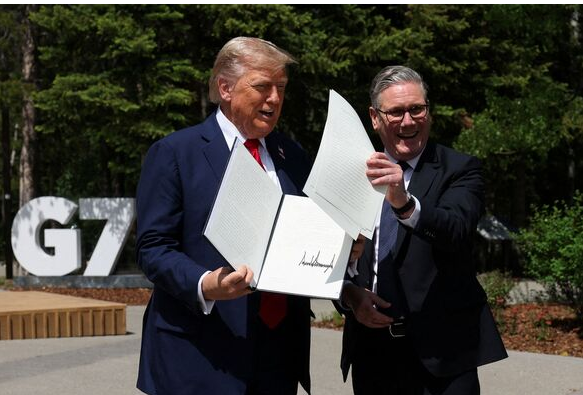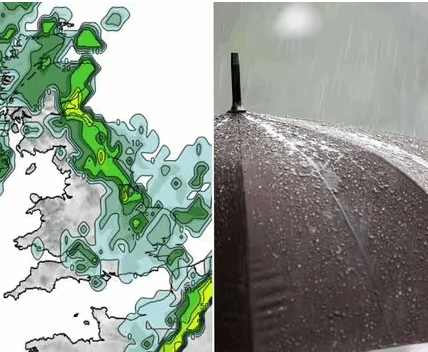EXCLUSIVE: As US President Donald Trump visits the UK, a Prosperity Institute report warns that EU regulations could hinder US-UK trade deals and increase costs for UK exports.

Donald Trump will meet with Keir Starmer on Monday (Image: AFP via Getty Images)
Private discussions between Keir Starmer and President Donald Trump may hit the rocks over the UK’s EU reset plans, senior US sources have warned.
“We are keeping a close eye on developments in UK-EU trade, and have some concerns,” said a senior Republican last night. “These concerns extend up to certain Cabinet members and the president himself. Many of us are asking whether the United Kingdom really wants a trade deal with the USA or not.”
It follows a new report which cautions that plans for regulatory alignment between London and Brussels will add to the cost of UK exports to the US and severely limit Britain’s chances of a comprehensive trade deal with Washington. Britain was the first country to agree a trade deal with the US during the second Trump administration.
The Economic Prosperity Deal (EPD) removed tariffs on 100,000 UK cars, aircraft parts, and engines and provided tariff-free trade on all steel exports as long as ownership met US security concerns. If the UK does not meet these requirements, however, those tariffs will resume.
The Prosperity Institute report cites fresh data to provide the most comprehensive breakdown of the current state of UK-US trade since the so-called Economic Prosperity Deal was struck earlier this year.
Under the terms of the UK-US EPD, the UK has agreed to open its market to US agricultural goods, including a reciprocal tariff-free quota for 13,000 tonnes of beef and 1.4 billion litres of ethanol. The deal stipulated that agricultural goods would need to meet the importing country’s food standards.
But if the EU Reset goes ahead, UK imports would need to meet EU standards instead, shifting control of the trade agreement from Westminster to Brussels.

US President Donald Trump and Sir Keir hold a signed US-UK trade deal (Image: POOL/AFP via Getty Images)
Last night, report author and economist Catherine McBride OBE said: “The EU is about to embark on a trade war with the US and they want to ensure that we are once more under their sphere of influence.
“But we should be under no illusion that the EU Reset, which encompasses agriculture, the EU Emissions Trading Scheme, and the Carbon Border Adjustment Mechanism, will place a future US-UK trade deal in jeopardy.
“It will add costs to US imports, prevent some products from entry, and threaten even existing trade with America.”
The US is the UK’s largest trading partner, accounting for 16% of UK goods exports and 27% of service exports in 2024, with balanced goods trade but increasing UK reliance on US fuel imports like oil, LNG, wood pellets, and ethanol due to net-zero policies.
The US is also the UK’s largest export market for services. Britain exported services worth just under £137 billion to the US in 2024 and imported services worth £61 billion, according to the UK’s ONS.
Conversly, the UK was the US’s largest market for service exports.
“The European Commission’s Demand Document gives the EU control over all of the UK’s agricultural and industrial imports,” said McBride.
“This is either via EU control of the UK’s food standards, animal welfare, pesticide regulations, organic regulations, food marketing standards, and its sanitary and phytosanitary regulations (SPS), or via control of the UK’s emissions trading scheme (ETS) and the UK’s Carbon Border Adjustment Mechanism (CBAM).
“The EU’s CBAM currently covers imported steel, aluminium, cement, fertilisers, hydrogen, and electricity. The EU is also considering including maritime emissions from import transportation.
“All of these regulations will now be set by the EU, not by the UK’s elected government.”
She added: “So, despite voting to leave the EU in 2016, and despite none of the terrifying predictions about leaving the EU coming true, and despite the UK rolling over or improving all of the old EU trade deals and signing new trade deals with Australia, New Zealand, the CPTPP, India, and the US – trade deals that the EU does not have – the EU will now be able to control the trade the UK conducts with these countries.”
Sarah Elliott, Director of the Prosperity Institute’s UK-US Special Relationship Unit, added: “EU standards are highly protectionist, and if the UK adopts them, it will decrease US trade, making goods and services more expensive.
“The UK cannot make both trading partners happy by harmonising its regulations to EU standards.
“It should mutually recognise EU and US regulations.”

